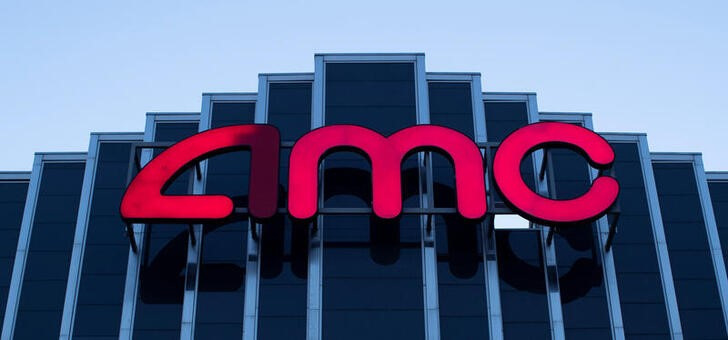AMC meme investors win rare access to evidence in fight over $129 mln settlement

The sign of the AMC theatre in Burbank, California. REUTERS/Mario Anzuoni Purchase Licensing Rights
(Reuters) - Faced with an extraordinary flood of objections from AMC Entertainment Holdings Inc investors who are suspicious of a proposed $129 million settlement on their behalf, a Delaware judge on Saturday ordered the movie theater company to throw open access to all of the evidence underpinning the deal.
The proposed settlement would resolve claims that AMC’s planned convergence of preferred and common shares shortchanges the so-called meme-stock investors who buoyed the company during the pandemic. Under the terms of the controversial proposal, AMC would award one extra share of post-conversion stock to common shareholders for every seven shares held prior to the conversion.
Plaintiffs' lawyers backing the deal have valued it at $129 million — but pro se common shareholders have nevertheless overwhelmed Vice Chancellor Morgan Zurn’s Delaware Chancery Court docket with letters asking her to reject the settlement, block the restructuring and even invalidate AMC’s preferred shares. (Those last two are beyond Zurn's authority in the case before her.) Many have expressed more anger at the company than the settlement itself. Some have told the judge that they feel AMC executives and their allies are favoring preferred shareholders.
AMC counsel at Weil, Gotshal & Manges and Richards, Layton & Finger did not respond to email queries. An AMC spokesman also did not respond to a request for comment.
In April, the Delaware judge appointed a special master to handle requests by AMC shareholders to intervene in the case or to object to the settlement.
The special master, Corinne Amato of Prickett, Jones & Elliott, has since discouraged most requests by individual shareholders, including a pro se motion to depose AMC’s CEO and board members and a motion to obtain sealed documents from federal court litigation involving AMC. But Amato found enough merit in investors’ request for access to the discovery record to call earlier this month for responses from AMC and the plaintiffs lawyers who negotiated the proposed settlement.
Both sides vehemently opposed allowing proposed objectors to see confidential evidence, in a remarkable pair of briefs that questioned the motives of some of the settlement’s most outspoken opponents.
AMC’s lawyers from Weil and Richards Layton pointed to threats of litigation against the company’s financial advisor by one settlement opponent, “Al from Boston,” with a popular YouTube channel. Shareholder lawyers at Bernstein Litowitz Berger & Grossmann; Grant & Eisenhofer; Saxena White; and Fields Kupka & Shukurov detailed “shameful” tactics by settlement opponents, including alleged online conspiracy accusations seemingly designed to intimidate shareholders who support the deal.
“Certain purported stockholders have stooped to the nadir of online anonymity,” the plaintiffs' brief said, “giving into the worst of mob mentality.”
AMC and plaintiffs' lawyers also highlighted the risk that objecting shareholders would abuse their access and leak confidential documents. The case record, AMC said, contains thousands of pages of sensitive information, including forward-looking models and projections, documents discussing the company's potential business initiative and even confidential rent and pricing information. If that information became public, AMC said, the company could suffer irreparable harm.
Plaintiffs' lawyers also warned that ill-intended investors might use confidential information to engage in insider trading. Meme-stock investors helped rescue the company, the brief said, but some of them can no longer be trusted to act in AMC's interests.
Overall, said AMC and plaintiffs' lawyers, the risk of granting access to settlement opponents vastly outweighs objectors’ purported need to see the documents.
Special master Amato acknowledged both sides’ "sincere and rational confidentiality concerns" in a report issued on Friday night. But she said those worries do not override Delaware precedent allowing settlement objectors to examine the case record.
Amato recommended that Zurn place a precondition on shareholders who want to access the evidentiary record, requiring them to sign (and have notarized) a special agreement pledging to use the confidential material only to sharpen their objections to the proposed settlement.
Zurn adopted Amato’s recommendations in a ruling on Saturday. On Sunday, she approved AMC’s proposal to make the documents available electronically, albeit with security protections.
“Putative class members have shown extraordinary, if not unique, interest in the form of objections and letters to the court,” Zurn wrote. “It would not be surprising if this interest translated into a high number of stockholders seeking access to discovery in this case.”
Zurn seems determined to respect AMC’s small shareholders, many of whom have submitted letters describing how they lost both their life savings and their faith in the financial markets. It's true, as law professor Ann Lipton of Tulane University wrote in a blog post this weekend, that some of the investors who have written to Zurn appear to be “uninformed, to put it mildly,” espousing “odd conspiracy theories.”
But Zurn apparently wants to give them all an opportunity to educate themselves. If transparency is the best cure for misinformation and conspiracy theories, Zurn is doing her best to provide it.
We’ll have to see if any of the investors who claim to have been misled by AMC respond by betraying Zurn’s trust (and their own confidentiality agreements) by abusing the discovery she has permitted them to see.
Two of the most prominent objectors, Alex Mathew and Etan Leibovitz, did not respond to my emails about the discovery order. Shareholder lawyer Gregory Varallo of Bernstein Litowitz also did not answer my query.
One final point: It now seems clear that AMC and plaintiffs' lawyers erred when they first proposed a settlement process that would have basically made the class action notice and judicial approval procedures an afterthought. As I told you last month, their original proposal was immediately to grant common shareholders their extra share in exchange for allowing the preferred-share conversion to be completed without delay. In that scenario, the only issues left for Zurn to decide would have been shareholders’ release of classwide claims and fees for plaintiffs lawyers.
Zurn quickly rejected that idea, refusing to lift a status quo order that would have allowed for the quick payout and equity restructuring. The vice chancellor tartly reminded both sides that Delaware’s class action rules entrust judges with the authority to look out for the interests of all shareholders, not just those who negotiated proposed settlements.
AMC shareholders have told Zurn they’re counting on her, even for help way beyond the scope of the litigation that’s actually before her. The judge once again showed in this weekend’s orders that she’s trying to fulfill her duties to them.
Read more:
Sign up here.
Our Standards: The Thomson Reuters Trust Principles.
Opinions expressed are those of the author. They do not reflect the views of Reuters News, which, under the Trust Principles, is committed to integrity, independence, and freedom from bias.





